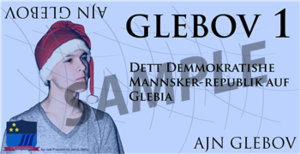Democratic People's Republic of Glebiania
This article refers to a micronation or element of micronationalism which is defunct and no longer exists. You can help make the article reflect that or ask on the talk page for further information. |
Democratic People's Republic of Glebiania | |
|---|---|
| Motto: Ad astra et infinitum (Latin: To the stars and infinity) | |
 South Atlantic, Sweden | |
| Capital | Glebshtatt |
| Official languages | English, Sprakk, Swedish |
| Demonym(s) | Glebian |
| Legislature | Parliament |
| Establishment | 27 September 2012 |
| Population | |
• (as of September 2013) census | 17 |
| Currency | Glebov |
| Time zone | (UTC+1) |
Website Government website | |
The Democratic People's Republic of Glebiania (Sprakk: Dett Demmokratishe Mannsker-republik auf Glebia), more commonly Glebiania was a micronation founded on 27 September 2012.
Etymology
The name "Glebiania" comes from "Gleby", the surname of the founder of Glebiana. Gleby is Polish and can be translated as "dirt" or "soil", which may seem ironic as the majority of Glebiania's territory is water.
History
The idea to create and found a micronation first came to Gleby's mind when he during a school assignment was reading numerous Wikipedia articles and began to read articles about small countries. On 26 September 2012 he started to design a passport for his at the time, imaginary country, out of sheer boredom.
As the passport was being designed, it became apparent that in order to present the passport in a manner that strengthened its legitimacy and aesthetic appeal, it was necessary to give the country a name. The first name planned was Glebia, which still to this date is the word in Sprakk for Glebiania.
However, after consulting with his friends, Gleby changed the name to Glebiania a few days later. Thus, Glebiania came into existence.
Geography and Climate
Glebiania's two territories were the South Atlantic Namibian Colony (SANC), and the federal district Glebshtatt.
Contrary to what the name suggested, the South Atlantic Namibian Colony was in fact not an actual colony. It was located outside of Namibian territorial water, and was 100 square meters large.
Glebshtatt was the name of the federal district and capital of Glebiania, located on the west coast of Sweden, surrounded on all sides by Swedish territory. Glebshtatt was the seat of the Glebian government and all other government administration. Due to the geographic location of Glebshtatt, winters were often cold and snow fell in large quantities.
Both the South Atlantic Namibian Colony and Glebshtatt were in the UTC+1 timezone.
Government and politics
Cabinet
As a President was elected, he or she would appoint ministers in following departments: The Department of Foreign Affairs, The Department of Justice, The Department of Finance, The Department of Defense, The Department of Culture, and The Department of Shellfish.
Legislature

The legislating power in Glebiania was divided between two instances; the President and the Constitutional Court (not to be confused with the written constitution stating the main principles of Glebian law). Any citizen of Glebiania could write a proposition and send it to the President. The proposition would then be examined by the five members of the Constitutional Court and would either be approved to be voted on in a referendum, or banned if the Constitutional Court found it to contradict the written constitution.
The Constitutional Court held veto power over bill proposals before they were voted on in a referendum. Suffrage in legislative matters as well as in presidential elections in Glebiania was granted to all citizens of Glebiania who had an age of majority. When the proposal would be voted on in a referendum, the majority of the votes had to be in favour. If they were, the proposal would pass and the President would take actions accordingly.
A previous, published draft for a constitution named the "Uddevalla-koden" has since its publication on the country's website in late 2012 been redacted.
In January 2013 a constitution was written and proposed by the Glebian government. The constitution was published for viewing, and a few weeks later a referendum was held. The proposed constitution was rejected in Referendum 1 of 2013, which was the first referendum in Glebiania.
Foreign relations
Glebiania had very little diplomatic presence abroad. The only embassy of Glebiania in existence was the Glebian Embassy to Sweden.
On 30 December 2012, the President and Minister of Foreign Affairs posted on the MicroWiki forums and welcomed micronations to contact him regarding diplomacy, as an attempt at strengthening Glebiania's presence and relations abroad.
On 5 March 2013 Glebiania formally recognized the Monarchy of New Scotland. After an email-correspondence with Her Royal Majesty, Queen Elizabeth I, the Glebian president formally recognized the Monarchy of New Scotland. The entering of diplomatic relations with the Monarchy of New Scotland was the first of its kind in Glebiania, marking a historical event. Since the disbandment of Glebiania all diplomatic relations have ended.
The nation's Twitter account and email account were the main channels for diplomatic affairs.
Economy

The government of Glebiania did not collect tax, or had any other way of gaining any revenue. The last President paid some of the state's expenses himself, however, these expenses were generally very low.
The Department of Finance was in charge of the tax-administration, which always remained non-existent. The Minister of Finance would oversee the currency exchange in Glebiania and the annual budget proposals.
The currency of Glebiania was Glebov (GLE). Despite that the country claimed to have its own currency, there were no bank notes or coins in use. On December 29, 2012, the current President, Minister of Justice, and Minister of Finance designed and approved the first bank note in Glebian history; a bank note worth 1 Glebov.

Culture
The culture of Glebiania was similar to Swedish and Scandinavian culture. Most Glebians celebrated Christmas, Easter, and Midsummer's Eve. Some, other, national holidays were more unique for Glebiania, such as Independence Day (typically considered to fall on 26 September).
The three official languages in Glebiania were English, Swedish, and Sprakk. Sprakk is a constructed language, invented in the Autumn of 2012 by the Department of Culture of Glebiania under the name of Glebish. Despite the fact that Sprakk was an official language in Glebiania, the majority of the Glebian population did not speak it. The Department of Culture of Glebiania estimated that 1-2 persons spoke the language.
The national sport of Glebiania was the video game Goldeneye: Reloaded. Annual tournaments in Goldeneye: Reloaded were being planned by the Department of Culture to be held in Glebshtatt. They would be open to enter for any citizen of Glebiania.
Media
News in Glebiania were often tweeted on the country's Twitter profile, but some more significant announcements were posted on Glebiania's homepage, with varying tones of formality. On 1 December 2012 the Department of Foreign Affairs announced via Twitter that a newspaper would be founded.
Both the news on the government website and the tweets by the Department of Foreign Affairs were written in English.

